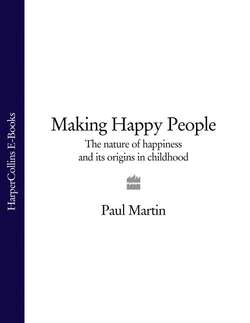Читать книгу Making Happy People: The nature of happiness and its origins in childhood - Paul Martin - Страница 31
12. Present- and future-mindedness
ОглавлениеWe are better equipped to be happy if we can enjoy the present, prepare for the future and avoid dwelling on the past. Happy people are usually able to think ahead, but they do not spend their lives waiting for some imaginary future or endlessly mulling over bad things that happened in the past. They are also capable, at the right times, of losing themselves in the here and now and relishing the present moment.
Our consumerist culture encourages people to strive after things that they believe, often wrongly, will bring them happiness in the future – notably money, material possessions and social recognition. Meanwhile, they find it hard to enjoy the present because their thoughts are focused on a future state they have not yet attained and perhaps never will. Happy people can prepare for the future without having to live there, and they can savour the moment without sticking their head in the sand.
Many philosophers, religious thinkers and self-help gurus have stressed the importance of being able to live in the present. A starting point is to become ‘grounded’—that is, gently aware of your current surroundings, rather than fretting about all the things you have to do. Being grounded and focused on the present moment can bring pleasure and calm. It is certainly a useful skill that any busy person would benefit from learning. Various practical techniques have evolved over the centuries for clearing the mind, silencing the cacophony of mental activity and becoming mindful of the present. However, most people notice some improvement if they simply pay attention to their own breathing for a minute or two.
Being rooted in the present can be pleasant, but it does little to produce satisfaction – one of the three fundamental elements of happiness. Often, the course of action that will ultimately bring the greatest satisfaction, and hence the greatest overall happiness, requires a degree of future-mindedness. Happy people generally have a well-developed capacity to control their immediate urges and take the longer view – an important capability that psychologists refer to as delayed gratification.
In a series of experiments conducted in the 1970s and 1980s, American psychologists investigated delayed gratification in children, and its links with other aspects of personality. In a typical experiment, a pre-school child was offered a tempting marshmallow; if the child was able to wait for, say, 15 minutes before eating the marshmallow then he or she was rewarded with a second marshmallow. Some children were able muster the self-control needed to delay their gratification, but others succumbed to temptation and ate the first marshmallow immediately, even though they knew this meant forgoing the second. (You probably know the feeling.)
The important discovery was that children who were better able to delay their gratification at the age of four or five grew up to become more competent adolescents. Follow-up studies conducted a decade later found that individuals who could wait longer to receive a bigger ultimate reward at the age of four or five developed into adolescents who were socially and academically more competent, better able to cope with frustration and stress, and better at communicating than those who lacked self-control. They also achieved more at school. A prominent expert on self-esteem later commented that ‘self-control is worth ten times as much as self-esteem’.
